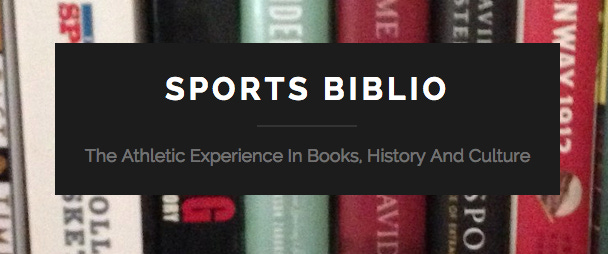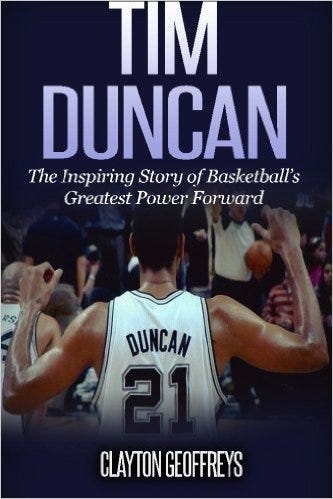Sports Biblio Digest, 7.17.16: Tim Duncan's Understated Greatness

News, Views and Reviews About Sports Books, History and Culture
Also In This Issue: Last Dash for Usain Bolt; A Cheap Shot at American Soccer Fans; Sports Biblio’s Book Review Collection; New Librarian of Congress
Welcome to the Sports Biblio Digest, an e-mail newsletter delivered each Sunday. You can subscribe here and search the archives.
This is Digest issue No. 47, published July 17, 2016. The Digest is a companion to the Sports Biblio website, which is updated every Monday, Wednesday and Friday. To view this newsletter in a browser, please click here.
I’d love to hear what you think about the Digest, and Sports Biblio. Send feedback, suggestions, book recommendations and requests for interviews to Wendy Parker, sportsbiblio@gmail.com. You can also follow Sports Biblio on Twitter and hit the “like” button on Facebook.
* * * * * * * *
Tim Duncan retired this week after 19 NBA seasons, five championships and two MVP crowns, all with the San Antonio Spurs, and the release of the news was as understated as his career.

There was no farewell tour, no posting on The Players Tribune, no gauntlet of national media interviews to follow. He didn’t even show up for his own retirement announcement, although he posted a letter on the Spurs’ website.
For Duncan, the decision to step away from the game was easy after what turned out to be an injury-riddled final season: “The game wasn’t fun any more.”
While he didn’t expect the heavy response of praise from fans, players and others in the basketball world, surely he understood how much of a rarity he had become as a sports superstar, seemingly not without an ego, but at least knowing how to hold it in check.
As I wrote earlier this week on the blog, the “quiet athletes” are the ones we seem to like the most, primarily because we don’t know as much about them as others who live for the spotlight.
However, Duncan always was a bit different of a sports figure, especially in the personality-driven NBA. As Ben Cohen noted at The Wall Street Journal, Duncan’s humility and politeness stirred from such a deep place that he co-wrote a paper as a college student at Wake Forest called “Blowhards, Snobs and Narcissists: Interpersonal Reactions to Extreme Egotism.”
He shelved any notions of becoming an academic psychologist, but Duncan carried on in the NBA as if he’d memorized the paper. Was this guy really too good to be true? Never a hint of controversy or bad behavior ever followed him and books about Duncan were almost entirely geared to young people.
While his career is Hall of Fame material, his personality will never be bestseller fare. Ian Crouch wonders at The New Yorker:
“Was it a burden—or boring, at least—to constantly be called the good guy, even if you were, in fact, a good guy?”
We may never know that much (or little) from Duncan, as he checks into even greater post-retirement anonymity.
In a profile for SLAM Magazine, Scoop Jackson wrote years ago that it’s easy to misjudge Duncan: “Tim Duncan is quiet, but not uninteresting. Too few see that.”
At The Vertical, Spurs general manager R.C. Buford talks with Adrian Wojnarowski about Duncan’s career, how he almost left as a free agent in 2000 and his contributions to one of the most-admired pro sports cultures in North America.
A Few Good Reads
Kareem Abdul-Jabbar remains for me an endlessly intriguing retired athlete, as evidenced by this terrific Q and A with Smithsonian Magazine about his love for history, youth sports and book recommendations;
Are the Olympics worth having at all? BBC Sports editor Dan Roan thinks so, despite the organizing mess in Rio and the state-sponsored doping scandal in Russia;
At Sports Illustrated, Tim Layden’s cover piece this week is on Usain Bolt’s final Olympics and his place among the greats of track and field history;
A traveling exhibit of artifacts from the collection of Brazilian international track and field official Roberto Gesta de Melo has arrived at the Caixa Cultural Rio de Janeiro for the Olympics. “Esporte Movimento” features more than 1,300 items and will be on display through Sept. 25;
A coaching friend of mine, Texas A & M women’s basketball assistant Bob Starkey, was a college mentor to Seimone Augustus of the WNBA champion Minnesota Lynx. This week she was among four Lynx players staging a pro-Black Lives Matter protest that prompted off-duty police providing game security to walk out. On his blog, Starkey issued a heartfelt plea to find a way to overcome such deepening division: “We are no longer seekers of truth but searchers of verification.” This is one of the best things I’ve read on the subject but I fear we're a long way from coming to any kind of understanding;
Crying Jordan Face is one of the more ridiculous memes made famous on Twitter (and that’s saying a lot). At the U.S. Sport History blog, Washington University lecturer Noah Cohen offers up a solid thinkpiece about the subject that’s far more intelligent than the photoshopped idiocy that seemingly has no end.
From the Manufactured Bull**** Files
At the Midfield Press, an American soccer fan blog, contributor Stuart McTaggart calls out a piece in The New York Times Magazine purporting to show the racism of Seattle Sounders supporters. “The Dark Side of American Soccer Culture,” by Jay Caspian Kang, is based on his attendance at one recent Sounders game—they lead Major League Soccer with an average of 40,000 fans at home—and a reference to Bill Buford’s 1990 book, ”Among the Thugs,” about violent English fan culture in the years before the Premier League.
As James Bridget Gordon notes at Paste Magazine, Kang “paints in broad strokes to reveal a picture of white suburban rage throughout the Western World bubbling to the surface, suggesting, in some subtle way, that the line between an MLS game and a Donald Trump rally is very thin indeed.” Kang’s lead says it all:
”For the stunted American male, frustrated with the changing demographics of the country and gripped by the belief that his days on top are coming to an end, there may be no form of pornography more satisfying than watching a bunch of hard-drinking, pub-singing soccer fans with thick brogues beat the hell out of one another.”
I can’t say I’m a big MLS fan, and in my experience as a journalist I’ve found American soccer fans to be overly sensitive. In this case, however, they’re right to be upset.
Kang’s fixation on “whiteness” in sports has been noted previously. On Twitter, he condescendingly responded to the soccer story by saying that “my mentions right now look like a widespread panic concert.” That's a reference to a Southern rock band based in Athens, Ga. that descends from the tradition of the Allman Brothers, one of the iconic bands of my youth. Kang knows not even the slightest bit of history about that blues-infested genre, but being accurate appears to be as important to him as being fair.
I refuse to take offense at such lazy and dishonest twaddle, but I can perfectly understand why some in the American soccer fan community are roiling. As MLS commissioner Don Garber noted simply: “It was just poor journalism.”
More than that, it’s a shameful comedown on soccer coverage for the NYT, where the marvelous and now-retired columnist George Vecsey has done as much as any American journalist to write about the sport in this country with respect and diligence.
Sports Book News and Reviews
Dvora Meyers’ book “The End of the Perfect 10,” published last week, comes as the U.S. Olympic gymnastics trials took place ahead of Rio. On NPR, she speaks with Michel Martin about how the sport has been altered in the 40 years since Nadia Comaneci earned the first perfect score at the Olympics;
Jane Leavy really wanted to like “Love Game,” British writer Elizabeth’s cultural history of tennis, but was sorely disappointed: “I would have liked to hear more from her about the intersection of creative genius and physicality: tennis as a work of art.” Instead, Leavy writes in her review for The Wall Street Journal, the book is “a political diatribe on capitalist globalization and corporate greed. I haven’t seen the word ‘cohort’ this often since SDS manifestos of the 1960s.”
“Professor in the Cage” author Jonathan Gottschall (whose book was the subject of the first Sports Biblio book review) writes about books about fighting that influenced him, in particular George Plimpton’s “Shadow Box;”
A recent book about the Earnhardt family made me think of my late stepfather, who retired to the Daytona Beach area for a reason, and would have enjoyed Jay Busbee’s account of his favorite driver and the growth of NASCAR and Southern culture;
Also this week I rounded up all the book reviews I’ve posted on Sports Biblio, and welcome your suggestions for future reviews. Here’s my preview of some notable new and forthcoming sports books, including several related to the Olympics, the subject of next week’s posts on the blog.
Off the Sporting Green
If you enjoy Annie Proulx novels as I do, you can’t help but deeply admire how she goes about her work as she explains at Lit Hub. Her new novel, “Barkskins,” an epic tale about environmental matters, is getting generally positive reviews, although the Irish Times calls it “a trite caper of an eco-calamity;”
The Millions has dropped its mid-year opus fiction and non-fiction preview lists;
The new Librarian of Congress is Carla Hayden, the head of Baltimore’s public library system. Gone is the lifetime appointment that comes with the job. Unlike her predecessor, James Billington, who was faulted during his 28-year-tenure for not keeping up with technology, Hayden will be limited to a 10-year term. The LOC has some great sports related digital collections, including the earliest Spalding Base Ball Guides, but there’s so much more that could be made available online. As Kyle Chayka writes at n+1, in the 21st century the library needs “a different, parallel mission to make digitization comprehensive and sustainable rather than a sideshow.”


